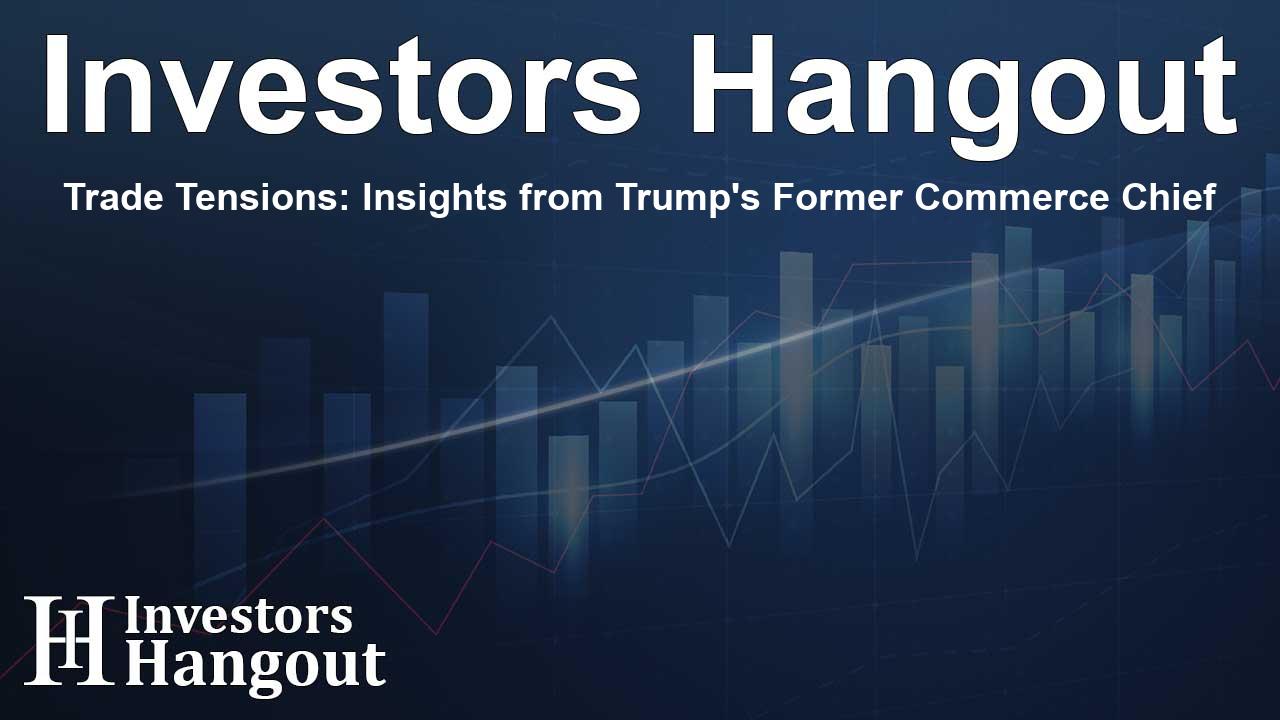Trade Tensions: Insights from Trump's Former Commerce Chief

Insightful Perspectives on U.S.-China Trade Relations
Wilbur Ross, former Commerce Secretary under President Donald Trump, has recently expressed concerns regarding the ongoing trade struggles between the U.S. and China. These apprehensions come in light of various trade agreements the U.S. has secured with notable global economies such as the EU and Japan.
Challenges in Reaching an Agreement with China
Ross acknowledges the crucial steps taken by the current administration to strengthen trade ties with other nations. Despite these efforts, he remains skeptical about the potential for a parallel agreement with China, a nation recognized as America’s most significant economic competitor. The timing of key political events in China, particularly an important leaders' meeting, presents additional challenges for any swift resolution.
The Importance of Timing and Perception
Another important factor discussed by Ross is the political climate in China. The upcoming leadership meeting could obstruct any immediate trade negotiations. He emphasized that China is unlikely to acquiesce to demands that could be perceived as capitulation to U.S. pressure, particularly in the context of current world events.
Impact of Tariffs on Trade Dynamics
The trade rivalry, underscored by a series of tariffs imposed between the two nations, has had pervasive effects on the economy. Following a temporary respite, Ross warned that without a conclusive trade agreement, tariffs previously levied could be reimposed, adversely affecting Chinese exports to the U.S. This on-going tariff war represents a significant threat to industries reliant on trading with China.
Alterative Strategies by China to Circumvent Sanctions
In light of the economic pressures, Ross indicated that China may explore avenues to circumvent U.S. sanctions. One possibility includes rerouting shipments through countries that maintain favorable tariff conditions. However, the ultimate effectiveness and implementation of such tactics remain uncertain.
Understanding the Risk of a Sustained Trade War
Ross articulated that while trade disputes present risks, the confinement of these tensions primarily to China limits broader economic hazards. His commentary sheds light on the complexities faced by the U.S. as it navigates its positions with diverse trading partners.
The Broader Context of U.S.-China Trade Talks
As trade discussions progress, recent diplomatic sessions held in various locations, including Stockholm, have emphasized the delicate nature of U.S.-China relations. U.S. Treasury Secretary Scott Bessent remarked that any extension of tranquility in tariffs is contingent upon President Trump’s ultimate decision, further stressing the unique challenges the administration faces in reaching agreements with major economies.
Potential Consequences of Trade Agreement Failures
Inactivity or failure to cement a substantial trade agreement could financial repercussions for Chinese exports. Recent analyses from economic authorities suggest that without a new trade agreement, U.S. tariffs could precipitate a staggering decrease of nearly $488 billion in exports from China by several years. These projections amplify fears surrounding the long-term effects of unresolved trade disparities.
Criticism and Skepticism of Current Trade Frameworks
Amidst these developments, critiques have surfaced regarding the integrity and details of the trade agreements recently established with the EU. Industry analysts have argued that the terms presented thus far resemble a mere framework rather than a concrete plan, indicating that these deals could undergo significant alterations. The projected $750 billion purchase agreement of U.S. energy products by the EU over the coming years has also raised eyebrows concerning its viability.
Frequently Asked Questions
What are the main concerns expressed by Wilbur Ross regarding China?
Wilbur Ross highlights the challenges of negotiating a trade agreement with China, emphasizing China's hesitation to appear submissive to U.S. demands and the timing of Chinese political events.
How might tariffs affect China’s economy?
The potential reintroduction of tariffs could severely limit Chinese exports to the U.S., which are projected to decrease significantly without a new trade agreement.
What alternative strategies might China employ in response to U.S. sanctions?
China may consider rerouting shipments through countries with lower tariffs to bypass U.S. sanctions, though the effectiveness of this method is still unclear.
How does Wilbur Ross view the overall trade tensions?
Ross believes that while trade tensions are significant, the primary focus of risk remains limited to China, which could help mitigate broader economic impacts.
Why has criticism arisen surrounding recent trade agreements?
Critics argue that trade agreements with the EU may lack substantial details and could change, questioning the practicality of large commitments such as energy purchases.
About The Author
Contact Lucas Young privately here. Or send an email with ATTN: Lucas Young as the subject to contact@investorshangout.com.
About Investors Hangout
Investors Hangout is a leading online stock forum for financial discussion and learning, offering a wide range of free tools and resources. It draws in traders of all levels, who exchange market knowledge, investigate trading tactics, and keep an eye on industry developments in real time. Featuring financial articles, stock message boards, quotes, charts, company profiles, and live news updates. Through cooperative learning and a wealth of informational resources, it helps users from novices creating their first portfolios to experts honing their techniques. Join Investors Hangout today: https://investorshangout.com/
The content of this article is based on factual, publicly available information and does not represent legal, financial, or investment advice. Investors Hangout does not offer financial advice, and the author is not a licensed financial advisor. Consult a qualified advisor before making any financial or investment decisions based on this article. This article should not be considered advice to purchase, sell, or hold any securities or other investments. If any of the material provided here is inaccurate, please contact us for corrections.
